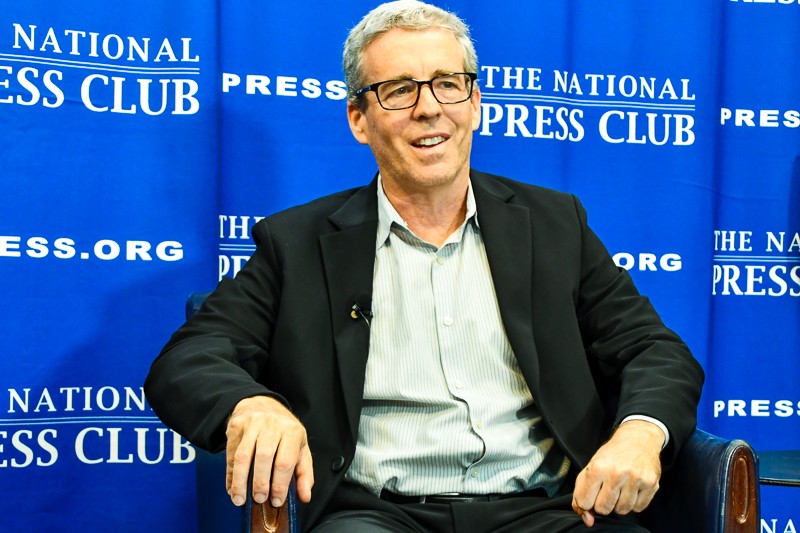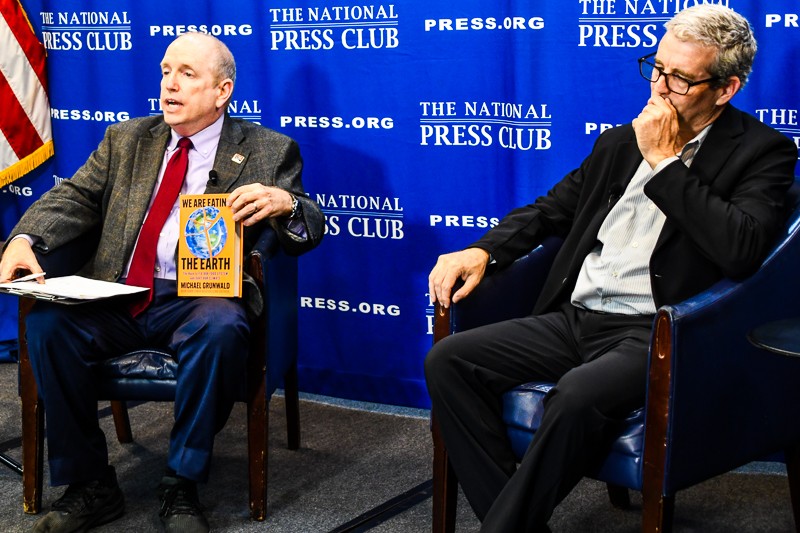Burgers to Biodiversity: Grunwald links diet to climate change
In a sweeping critique of the global food system, journalist and author Michael Grunwald told a National Press Club audience July 10 that agricultural practices and daily dietary choices are rapidly degrading the planet.
“Even if we quit fossil fuels,” he said, “we’ll keep hurtling toward climate chaos if we don’t solve our food and land problems.”
Grunwald spoke at a Headliners event about his new book, We Are Eating the Earth. He asserted that agriculture drives nearly one-third of global climate emissions, yet remains one of the least addressed components of climate change.

Grunwald, a former staff writer for The Washington Post, Time and Politico, said the environmental impact of food production is not limited to emissions. Land use, particularly the conversion of forests and natural ecosystems into farmland, is a central driver of climate change, biodiversity loss and water scarcity.
Grunwald emphasized the environmental consequences of agriculture with a focus on beef production and its disproportionate use of resources. Beef provides only 3 percent of Americans’ calories, but consumes half of the nation’s agricultural land.
“Cattle are extraordinarily inefficient converters of their food into our food,” he said. “The earth is becoming an animal farm.”
He described the scale of agriculture’s land use as staggering, noting that it covers an area equivalent to the size of Asia and Europe combined. Three-quarters of that land is used for livestock pasture or feed crops, he said, contributing to deforestation and the destruction of carbon-storing ecosystems.
“We’re still losing a soccer field worth of tropical forest every six seconds,” Grunwald said. “Trying to decarbonize the planet while continuing to tear down forests is like trying to clean your house while smashing your vacuum cleaner to bits in the living room.”
Grunwald also criticized biofuels, which he said were once considered a green alternative to fossil fuels, but now contribute to environmental degradation.
“Burning food to save the planet is a fantasy,” he said. “We’re subsidizing solutions that make the problem worse.”
He said his interest in agriculture’s climate impact began while fact-checking a story about his own environmentally conscious lifestyle. Despite having solar panels and driving an electric vehicle, he realized he still ate meat. That led him to call Tim Searchinger, a food and land expert, to ask whether meat was truly harmful to the climate.
“There are a thousand books about energy and climate,” Grunwald said. “And here this was a third of the problem and 3 percent of climate finance and like 0 percent of climate conversation.”
Grunwald acknowledged the complexity of reforming agriculture, noting that food production is tied to essential human needs and cultural traditions.
“With fossil fuels, we know what to do,” he said. “With food and agriculture, we don’t even know what we know. And we haven’t made any progress. The problem’s getting worse.”
He offered practical advice for individuals seeking to reduce their dietary climate impact.
“Eat less beef. Waste less food. And eat even less beef,” he said.

He noted that going vegan is the most climate-friendly diet, but even cutting out beef and lamb can have a significant effect.
Grunwald pointed to emerging technologies such as gene-edited crops, precision agriculture and alternative proteins as promising solutions. He also called for smarter policies, including tying farm subsidies to environmental performance and adopting a new land ethic that values every acre.
He said the fight to reform the food system is not just about emissions, but about land, and the future of the planet.
“We are eating the Earth,” Grunwald said. “And the greatest challenge facing our species will be to slow our relentless expansion of farmland into nature.”
